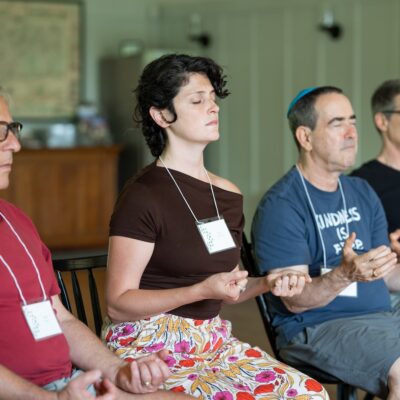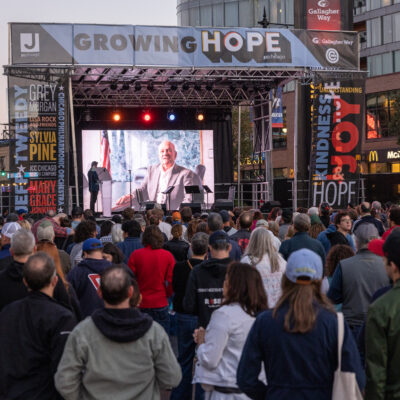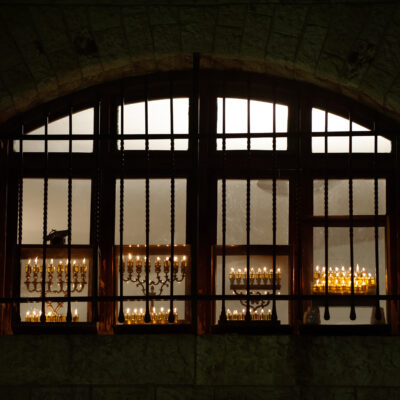Opinion
MEN’S CLUB REFORM
Beyond being a mensch: Confronting misogyny and antisemitism in the ‘manosphere’
In Short
Synagogues can provide spaces for men to learn about and practice healthy masculinity and move them away from the toxicity pushed by social media influencers
Like a lot of Jewish parents, when I drop my kids (boys) at school I say, “Be a mensch!” I want them to be good people, who make good choices. But knowing that I’m also raising two young men in the digital age, I fear that menschlichkeit will not be enough to repel the messages my kids get outside of my home.
The recent Mother Jones article, “Masculinity Influencers Are Pivoting to Wildly Antisemitic Claims,” sheds light on a disturbing trend within the so-called “manosphere” — a loosely connected online network of blogs, forums and communities that promote and discuss topics related to men’s rights, masculinity and often perpetuate misogynistic, antifeminist and sometimes extremist views on gender relations. Antisemitism is one of the extremist views floating around the manosphere.

Illustrative. Men greeting each other in a synagogue. maskot/Getty images
The toxic blend of misogyny and antisemitism being peddled by these influencers is not only alarming but also demands a response that goes beyond the well-meaning advice to “be a mensch.” While the call to be a good, decent person — what “mensch” traditionally signifies in Jewish culture — is valuable, it’s increasingly clear that this alone is insufficient in confronting the virulent ideologies taking root in online spaces.
The “manosphere” has long been a breeding ground for toxic masculinity, where outdated and harmful notions of what it means to be a man are propagated. Recently, however, this space has seen a troubling shift as influencers within it — like Andrew and Tristan Tate and Dan Blizerian — increasingly turn to antisemitic rhetoric to bolster their misguided beliefs, and/or to attract readers with those beliefs, and in turn, monetize the issue for themselves.
This blend of misogyny and antisemitism is not new, but its resurgence in the digital age and its spread through influential voices make it a particularly insidious threat. The reach of these ideas, and the ease with which they can be disseminated online, means that they have the potential to shape the attitudes and actions of millions of men around the globe — particularly those who are young, disillusioned or simply seeking a sense of belonging. Jewish boys and men are not immune to nor protected from toxic influences on their own.
The typical response to the dangers of toxic masculinity often involves encouraging men to “be a mensch.” The idea is that if men are simply kind, responsible, and moral, they can counteract the negative influences of the “manosphere.” But while being a mensch is a noble goal, it’s not enough to combat the deeply ingrained misogyny and antisemitism that characterize these spaces. In fact, the pressure to always be “a mensch” can sometimes lead to unrealistic expectations of needing to be more than human or perfect. This pressure sets up a binary in which men are either good or irredeemably bad,an oversimplification that doesn’t account for the complexities of human behavior.
What’s needed now is a more nuanced approach — one that goes beyond individual morality and focuses on creating environments where men can learn to lead by example as human beings striving to make the world safer, healthier and more equal. This means actively confronting and dismantling the toxic narratives that dominate the “manosphere” and replacing them with values that emphasize empathy, accountability, and social responsibility. Our goal should be finding and creating spaces where men can engage in open, honest conversations about their experiences, struggles and aspirations without falling back on the harmful tropes of traditional masculinity.
These spaces must be intentional and supportive, allowing men to explore their identities in ways that are not defined by dominance or aggression. They should encourage men to embrace vulnerability, to listen to the experiences of others — especially those who are marginalized — and to recognize the ways in which their actions and beliefs impact the world around them. Importantly, these spaces should foster a sense of community and solidarity, helping men to understand that true strength comes not from standing alone, but from working together to create a more just and equitable society.
The rise of antisemitism and misogyny in the “manosphere” is a call to action. It’s a reminder that the fight against toxic masculinity is far from over and that it requires more than just good intentions. It demands a proactive approach that challenges harmful ideologies at their root and provides men with the tools they need to become better human beings, not just better men. In doing so, we can begin to build a world where the values of empathy, equality and justice are not just ideals, but realities that guide our everyday lives.
The Federation of Jewish Men’s Clubs and the broader movement of men’s clubs work within Jewish communities have a crucial role to play in combating misogyny and toxic masculinity. By fostering spaces where Jewish men can engage in meaningful dialogue about their roles and responsibilities, men’s clubs can help dismantle harmful stereotypes and promote healthier models of masculinity rooted in Jewish values. Initiatives like mentorship programs, support groups, and educational workshops can equip men with the tools they need to challenge misogyny and antisemitism both within and beyond their communities, while also growing into their own masculinity in healthy ways. These opportunities are the best chance we have as fathers and men to show children the type of man the world really needs.
Rabbi Noam Raucher, is the executive director of the Federation of Jewish Men’s Clubs.

 Add EJP on Google
Add EJP on Google









